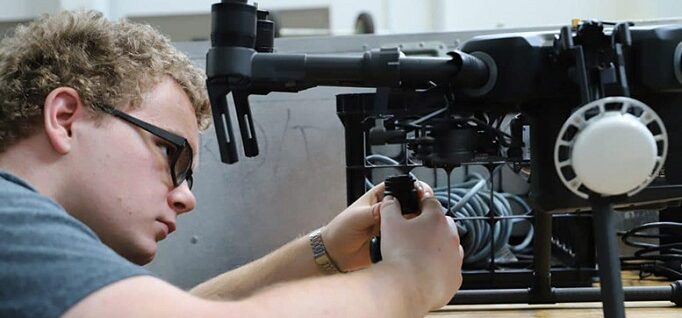Streamlining resources for student veterans
By Madeline Patton
November 20, 2024
The National Center for Autonomous Technologies (NCAT) at Northland Community and Technical College (Minnesota) has added a veteran resource section to its website and will soon launch a portal that integrates information and services that veterans now often learn about via word-of-mouth.
These digital resources and the advanced transportation center’s plans for new veteran-focused initiatives – such as cohort grouping, mentoring, experiential learning placements – are in response to what NCAT Principal Jonathan Beck has learned in the past year while dealing with his service-connected disabilities. Beck’s nine years in the Army National Guard included long, intense deployments in Kuwait and Iraq as an air traffic controller and then as a drone operator.
The Veterans’ Administration rated Beck’s service-related medical issues years ago, but he “kind of tucked it away” until about 18 months ago. At that point, he sought medical care and discovered an amazing array of help.
“It has become almost overwhelming for how much support there is out there across the community, not just for educational benefits,” he said, explaining his “call to action” is to help more veterans, who are enrolled in two-year colleges, obtain assistance.
“So what I’m looking at is really being able to invest the time and effort from a student service perspective to look into these great resources that already exist. This funding is already out there and, in a lot of cases, it’s going underutilized. How do we use that as another resource to support students in their educational tracks, but really addressing some of the underlying barriers that might prevent success in academic program,” he said during a presentation last month at the 2024 Advanced Technological Education (ATE) Conference.
ATE veteran-focused initiatives
The ATE program focuses on the education of technicians at two-year institutions of higher education. It is one of the National Science Foundation programs that include efforts that help veterans transition to civilian science and engineering careers. Here are some of the ATE initiatives that aim to help veterans; most of their resources are free for other colleges to adopt and adapt:
DeafTEC’s Project Good2Go offers online resources, professional development webinars and workshops to help STEM faculty meet the needs of student veterans, particularly those with tinnitus and/or hearing loss.
“Student veterans don’t even know about disability services, and even a lower number of them will go to student disability services to have just support,” said DeafTEC Principal Investigator Donna Lange. “Veterans, they don’t like to ask for help. It’s a sign of weakness. It’s not the culture of the military,” she said, explaining DeafTEC’s team has used surveys to identify what veterans need and then responded to what they’ve learned.
One of its most frequently used items from this research is the Top Ten Things Student Veterans Would Like Faculty to Know handout. It explains the implications of veterans’ seat selections, as well as how recording and captioning lectures and having course materials available in advance help hearing-impaired students learn.
The Microelectronics and Nanomanufacturing Veterans Partnership (MNVP) offers veterans a free, 12-week certificate program in semiconductor fabrication at six community colleges. The hybrid program features live-streamed lectures from Penn State University’s Center for Nanotechnology Education Utilization. Veterans attend hands-on labs in the cleanrooms of universities that partner with the community colleges near them.
This is the fourth semester that the program is offered at Rio Salado College and Arizona State University; Southwestern College and University of California, San Diego; Georgia Piedmont Technical College and Georgia Institute of Technology; and Tidewater Community College and Norfolk State University (Virginia). This fall, MNVP expanded to Tarrant County College and the University of Texas at Arlington, and Tompkins Cortland Community College and Cornell University.
VetTEC, which began years ago with the former SpaceTEC center in Florida, translates veterans’ military occupations to civilian jobs. Its industry-recognized certification exams in aviation, aerospace and technology check veterans’ skills and provide credentials that certify veterans’ qualifications to employers.
Veteran Career Training for Advanced Manufacturing Careers at Elizabethtown Community and Technical College (Kentucky) provides advanced manufacturing opportunities to soldiers who are completing their services at U.S. Army Garrison Fort Knox. Flexible courses in automation, robotics, industrial maintenance and electrical technology lead to stackable credentials that industry recognizes.
This article was originally published in CC Daily.



